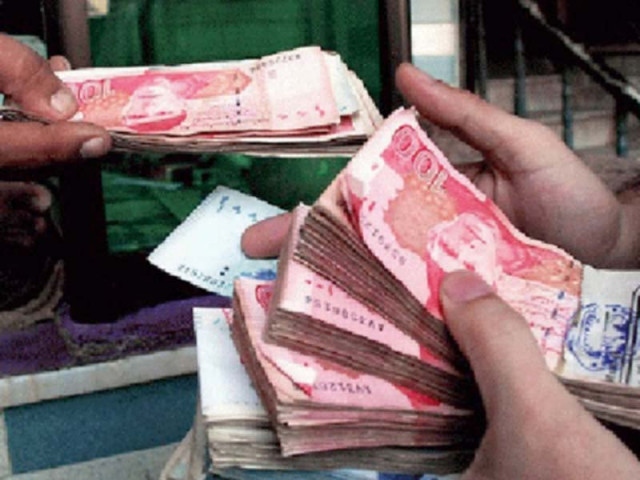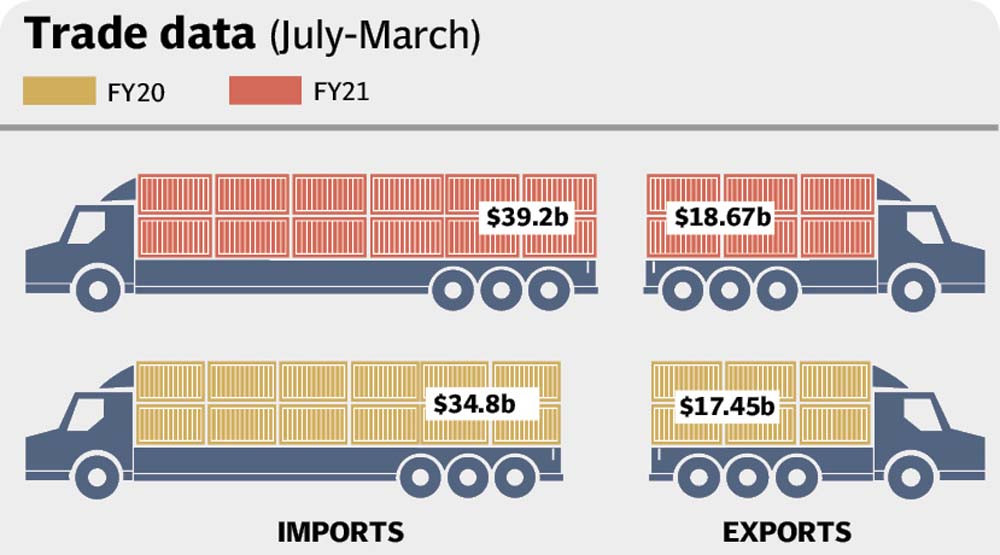Trade deficit widens to $3 billion
Expansion comes as exports grow at half the pace of increase in imports in March

Pakistan’s trade deficit widened almost 100% to $3 billion in March 2021, as exports grew at half the pace of increase in imports due to the country’s increasing reliance on imported commodities to ensure smooth supplies.
The nine-month (July-March) trade deficit widened over $20.5 billion, according to figures released by Adviser to Prime Minister on Commerce Abdul Razak Dawood on Thursday.
Exports, which were on a declining trend, picked up in March and stood at $2.35 billion, said Dawood. There was an increase of 29.3% or $531 million in exports on a year-on-year basis. These were the highest exports in the past three months.
However, imports soared over 60% to a record $5.3 billion last month on a year-on-year basis. In absolute terms, the imports increased $2 billion.
Resultantly, Pakistan’s trade deficit widened 98% in March 2021 on a year-on-year basis. The gap between imports and exports increased to $3 billion in March compared to a year ago, a jump of $1.5 billion in a single month.
Imports grew mainly due to increased imports of petroleum products, wheat, soybean, machinery, raw material, chemicals, mobiles, fertiliser, tyres, antibiotics and vaccines, tweeted Dawood.
For the last one year, Pakistan has been importing cotton, wheat and sugar to meet domestic needs. The government has also approved import of an additional 3 million tons of wheat to meet consumption needs this year.
The $2.35 billion worth of exports last month were the highest in the past three months. Earlier, in December 2020, exports had peaked at $2.4 billion.

Pakistan’s exports have long remained around $2 billion per month and the trend did not significantly change despite excessive currency depreciation during the Pakistan Tehreek-e-Insaf (PTI) government’s tenure in the past two and a half years.
During the Pakistan Muslim League-Nawaz (PML-N) tenure, exports had peaked at $2.3 billion and then dropped below $2 billion.
On a month-on-month basis, exports increased 13.4% to $2.35 billion, according to the commerce adviser. There was an increase of $277 million in export receipts in March 2021 compared to the preceding month.
Imports grew 15% month-on-month and stood at $5.3 billion last month. In absolute terms, there was an increase of $690 million in the import bill over February. As a result, the trade deficit widened 16.2% or $453 million in March over February.
During the July-March period of current fiscal year, exports increased 7% and stood at $18.7 billion compared to $17.5 billion in the same period of last year, according to the adviser.
In absolute terms, there was an increase of $1.2 billion in exports during the first nine months of current fiscal year.
However, the growth figures were disputed, as the State Bank of Pakistan’s data for the first eight months showed about 2% contraction in exports. Imports during the July-March period increased 12.6% or $4.4 billion to $39.2 billion. As a result, the trade gap recorded an increase of 18.2% to $20.5 billion. In absolute terms, there was an increase of $3.2 billion in the trade deficit.
The government has already missed the annual export target in its first two years. For the current fiscal year, it has set the export target at $22.7 billion, which will require 6.2% growth. Exports in the first nine months were equal to 83% of the annual target.
In a related development, Pakistan’s commerce adviser and Afghanistan Minister of Industry and Commerce Nisar Ahmad Ghoriyani signed a protocol for three-month extension of the Afghanistan-Pakistan Transit Trade Agreement (APTTA) 2010.
The signing ceremony was held through video link on Thursday simultaneously at Kabul and Islamabad.
Dawood said that his vision for trade and economic relations with Afghanistan and Central Asian Republics (CARs) was to make Pakistan a hub of trade, transit and transshipment.
“Our trade must be based on secure, open, consistent, reliable and legal movement of goods at the Afghan border along with enhanced connectivity with Afghanistan and CARs,” he said.
Published in The Express Tribune, April 2nd, 2021.
Like Business on Facebook, follow @TribuneBiz on Twitter to stay informed and join in the conversation.



















COMMENTS
Comments are moderated and generally will be posted if they are on-topic and not abusive.
For more information, please see our Comments FAQ